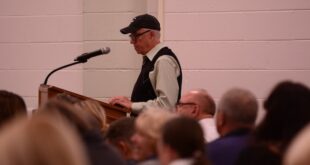
The Hamilton Street Business District re-imagining continued on April 1, with the approval by the Zoning Board of Adjustment of a three-story, nine-unit apartment building.
But unlike other apartment buildings approved in the District, this one will not feature retail space on the first floor.
Instead, and in recognition of reality in other parts of the District, there will be three apartments on the first floor.
Current zoning for the business district requires retail on the first floor for mixed-use residential projects that have frontage facing Hamilton Street.
But, as he did for at least one project as far back as 2019, the executive director of the Hamilton Street Advisory Board told the Zoning Board that this is not the time to require first-floor retail.
The Advisory Board, executive director Vince Dominach said, “specifically recommended the importance of not having the retail in this location … (there is) probably a 40- or 50-percent vacancy rate on the street. To add additional retail space would most likely remain vacant.”
“It’s very important to note that you have to look at the street as a whole, and the fact is the street needs more people on the street,” Dominach said. “It does not need at this time more commercial.”
The building is targeted for a 12,500-square-foot lot on the corner of Miller Avenue, and adjacent to the Dari Delite ice cream store.
The layout includes seven one-bedroom apartments and two, two-bedroom apartments. A total of 17 parking spaces will be provided in the rear of the building.
Developer Hamilton Street Development LLC had to appear before the Board for approval to remove the retail element and also for a waiver of the zone’s 40-foot building height requirement. Parts of the apartment building will be 42 feet tall.
The project did not sail through the hearing; several neighbors attended the virtual meeting to oppose the project, citing concerns about noise, safety and quality of life in the neighborhood.
Board vice-chairman Robert Shepherd said that he understood why the retail segment was not provided, but that he feared that area would become a “dead zone.”
“There will be no activity in front of this building,” he said. “I’m relatively sure that … there will be bars on the windows of the first floor of this building.”
Board member Joel Reiss said that he would add a condition to the approval, if one was offered, to prohibit the use of bars on first-floor windows.
The project’s engineer told the board that windows on the first floor would be made of high-imapct glass.
Neighbors were against the project, telling the Board that an apartment building did not fit in with the neighborhood.
“What is this bringing to the neighborhood?” Miller Avenue resident Joseph Rivera asked. “If we’re not doing the stores, fine. Why do we need more people? Where are they going to go? If college students are the audience, they’re not going to stay in the Hamilton Business District, they’re going to go to Easton Avenue.”
Rivera also said that the fact the building is mostly one-bedroom apartments “doesn’t mean you won’t have kids, and where are they going to play?”
Sandra Willis, also of Miller Avenue, told the Board that “this huge, intrusive, totally out of character apartment building … totally overwhelms the character … of our street.”
Calling the building “an aesthetically unappealing eyesore,” Willis said it would lower the values of neighboring homes.
“This glorified rooming house will be an albatross around the neck of our neighborhood,” she said.
Another Miller Avenue resident, Mohammed Hassan, said there should be no residential uses anywhere in the Hamilton Business District.
Hassan, whose property abuts the rear of the apartment building lot, also said the building would affect his privacy.
“Now I have people on the third story looking into my property,” he said. “I don’t know who’s looking at my family … are they recording?”
Venise Walton, who said she lives on Hamilton Street, across Miller Avenue from the targeted property, said she believed that the project “will cause a negative effect on the quality of life for the residents of this street.”
“Nine units will make the area very congested,” she said. “It could easily hold 31 or more people there. No one really knows how many people are going to be inside a one-bedroom apartment.”
Miller Avenue resident Henry Lee said the apartment building will generate noise in what he said was a quiet neighborhood.
“And we don’t know what kind of people will be coming around,” he said.
Peter Lanfrit, the developer’s attorney, said he was “having a hard time wrapping my head around some of the comments of some of the neighbors. I hear we don’t want residential there, we want commercial. If I were to show up next month to have a restaurant with outdoor dining, with a liquor license, pursuant to your ordinance, I may not be required to provide any parking for commercial uses, what do you think is going to happen?”
“If the applicant put commercial on the first floor, it would be 100 percent permitted, and if there was commercial on the first floor, we would have no obligation to provide parking for the commercial uses,” he said. “These comments are incomprehensible, and their logic, with all due respect, doesn’t make any sense.”
Lanfrit reminded the Board members that the only aspects of the application over which they had control were the height restrictions and the removal of retail on the first floor.
Shepherd said he agreed with Lanfrit.
“The seeds of this issue were borne when they started the Hamilton redevelopment area, and they allowed apartment buildings of this size in this district,” he said. “I can understand what the people on the side street are complaining about because it seems like a large building is moving in, but that’s not really for us, the only thing we have to decide is whether or not to agree to allow residences on the first floor.”
“If I were to say anything to these objectors, it’s to say they should speak to Vince Dominach and get the ordinance and zoning aspects changed to something they’re more comfortable with,” Shepherd said. “The issues that they brought up are not issues for us to decide.”
Board member Cheryl Bethea said that she understood the neighbors’ concerns, but “I think the issue is, the zoning board is not the forum. The Hamilton Street business committee is the forum to address the concerns of what’s allowable in this particular area.”
 The Franklin Reporter & Advocate Eight Villages, One Community
The Franklin Reporter & Advocate Eight Villages, One Community

